Rejuvenating Menopausal Skin: Proven Aesthetic Treatments & Techniques
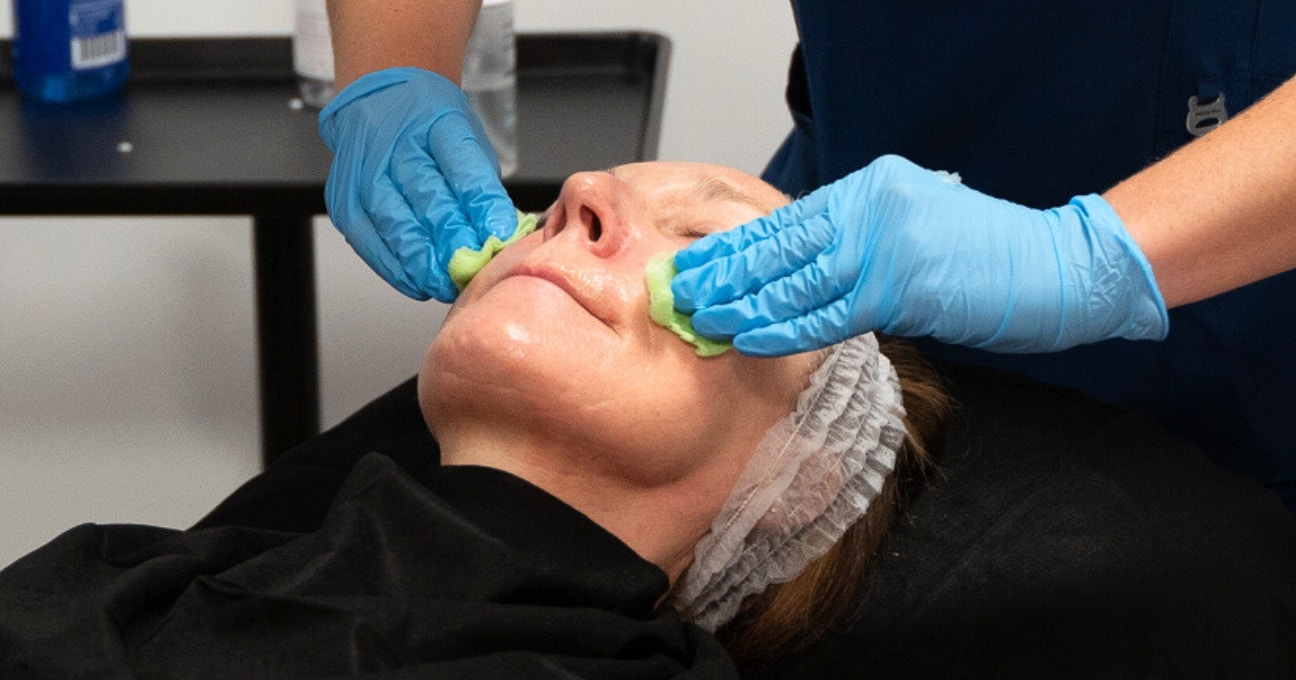
The lack of awareness of menopausal skin changes was highlighted recently in a study by skincare brand Hada Labo Tokyo.
In its survey of 1,010 British women aged 15-55 years, 42 per cent did not know that the stages of menopause can affect their skin.
According to the NHS, there are approximately 13 million women in the UK who are in perimenopause or who are menopausal. That’s one-third of the adult female population.
Given the number of effects menopause has on skin, it’s something all aesthetic practitioners should endeavour to understand.
Developing your expertise in this area allows you to provide solid, trustworthy advice, deepening your patient relationships. It also makes sound commercial sense given numerous aesthetic treatments that can truly benefit this cohort. This is a fantastic pathway to rewarding client journeys and great business opportunities.
Read on for an overview of the skin changes associated with menopause, facial ageing during this period and the aesthetic treatments that can help…
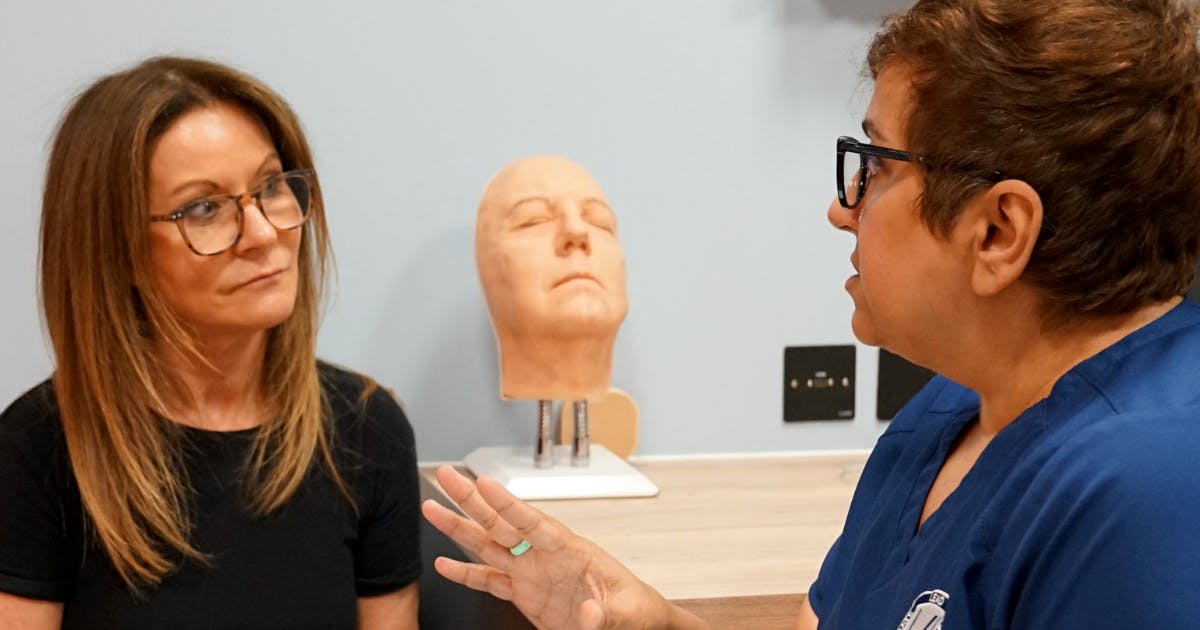
An overview of the menopause
Before we get into the changes these life stages can have on women’s skin and appearance, let’s first clarify what menopause is. It can be broken down into three phases:
- Perimenopause
- Menopause
- Postmenopause.
Perimenopause
Perimenopause is the initial transitional phase leading up to menopause and can last for around 4-10 years. During this time of hormonal flux, oestrogen levels slowly decline.
The average age of perimenopause onset in the UK is thought to be 47, however, many symptoms may go unnoticed for years.
Some common symptoms of being perimenopausal include hormonal fluctuations leading to irregular periods, hot flashes, night sweats, brain fog and mood swings. Additionally, sleep disturbances, joint pains and decreased sex drive are all typically associated with perimenopause.
Menopause
You are considered to have reached menopause following 12 consecutive months without menstruating. The average age for menopause in the UK is 51 years.
Postmenopause
The postmenopausal stage begins after menopause and continues for the rest of the person’s life. During this phase, hormone levels remain low and some menopausal symptoms may persist.
Post-menopausal symptoms can include hot flashes and night sweats, vaginal dryness, sleep disturbances, mood changes, decreased libido and urinary issues. Whilst many of these are also associated with perimenopause, they may be less severe during menopause.
Treating perimenopausal and menopausal symptoms
Patients should consult with their GP initially for diagnosis and management. It’s important to discuss any medications or holistic treatments your patients may be using to alleviate their symptoms during your clinical consultations. Treatments such as hormone replacement therapy (HRT) and low doses of antidepressants are frontline options.
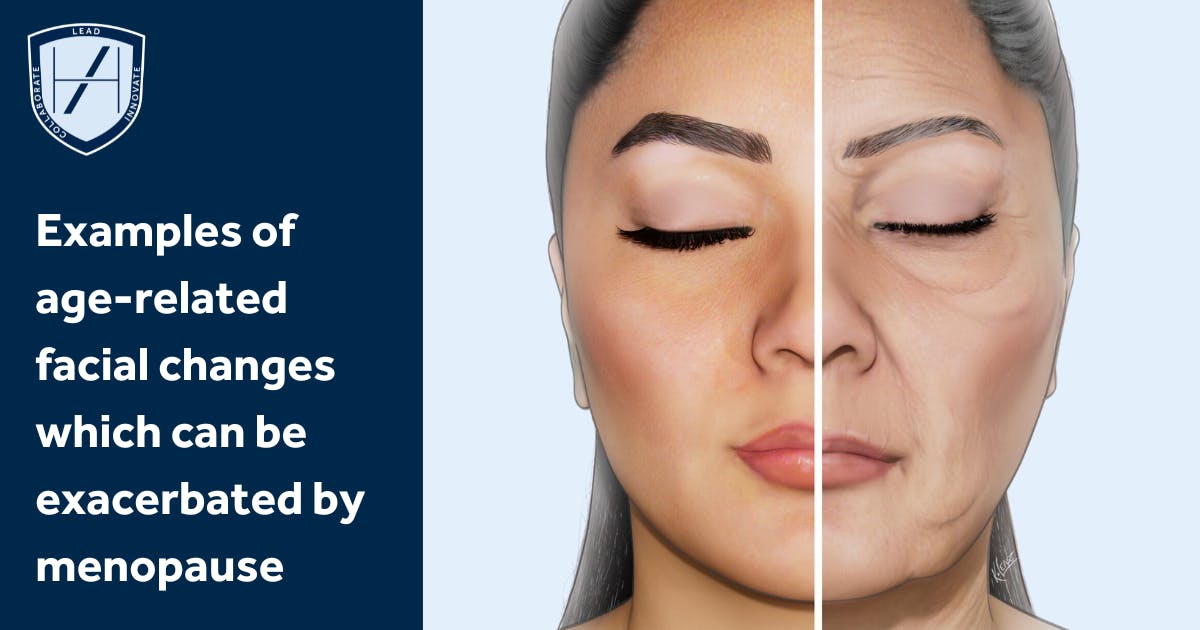
Facial ageing and skin changes during menopause
So how can aesthetic practitioners help patients going through perimenopause? What about those who are postmenopausal? The answers lie in the effects these phases have on the skin and facial ageing.
From perimenopause onwards, menopause can cause a number of changes to the face. These affect both skin quality and facial ageing.
Menopausal skin changes
During perimenopause and menopause, the following skin changes occur due to oestrogen levels dropping.
- Collagen decline: Collagen is the protein that provides structure and elasticity to the skin so declining levels can result in thinner, more fragile and potentially crepey skin
- Elastin decline: Elastin gives skin its flexibility and ability to bounce back. As such, when elastin production decreases it can lead to sagging skin and loss of firmness
- Dryness: Oestrogen helps the skin to retain moisture so, as supplies dwindle and oil production reduces, the skin can become drier and dehydrated. It may also become more prone to itching.
How facial ageing is accelerated by the menopause
As a result of hormonal changes during perimenopause, as well as skin and subcutaneous volume changes, facial ageing can be accelerated by menopause.
- Volume loss: Oestrogen helps to maintain our youthful facial fullness so, as oestrogen levels decline from perimenopause, the face can experience volume loss. This can be particularly noticeable in the mid-face and temples, causing hollowing or ‘sinking’ and sagging
- Loss of elasticity: Elastin helps to maintain the elasticity of the skin, so as oestrogen levels cause it to decline, the skin can become less elastic and more prone to sagging. This can cause the cheeks to descend and the jawline to become less defined. The lower face may start to become fuller as the mid-face ‘sinks’
- Deepening of wrinkles: The loss of elasticity can also lead to the deepening of wrinkles, particularly around the eyes, mouth and forehead. Fine lines may also become more prominent
- Loss of definition: The loss of volume and elasticity can also cause the face to lose definition. This can make the features appear less sharp, folds to become heavier and face shape to look more rounded.
Other skin changes that may occur during perimenopause
- Skin texture changes: Look out for rougher or more uneven textures
- Increased sensitivity: The skin may become more sensitive to irritants and allergens
- Hyperpigmentation: Dark spots or patches may develop or become more pronounced
- Slower wound healing: Wounds may take longer to heal due to the thinner skin and decreased blood flow. This is something to bear in mind when discussing recovery time with your patients, especially for microneedling sessions.
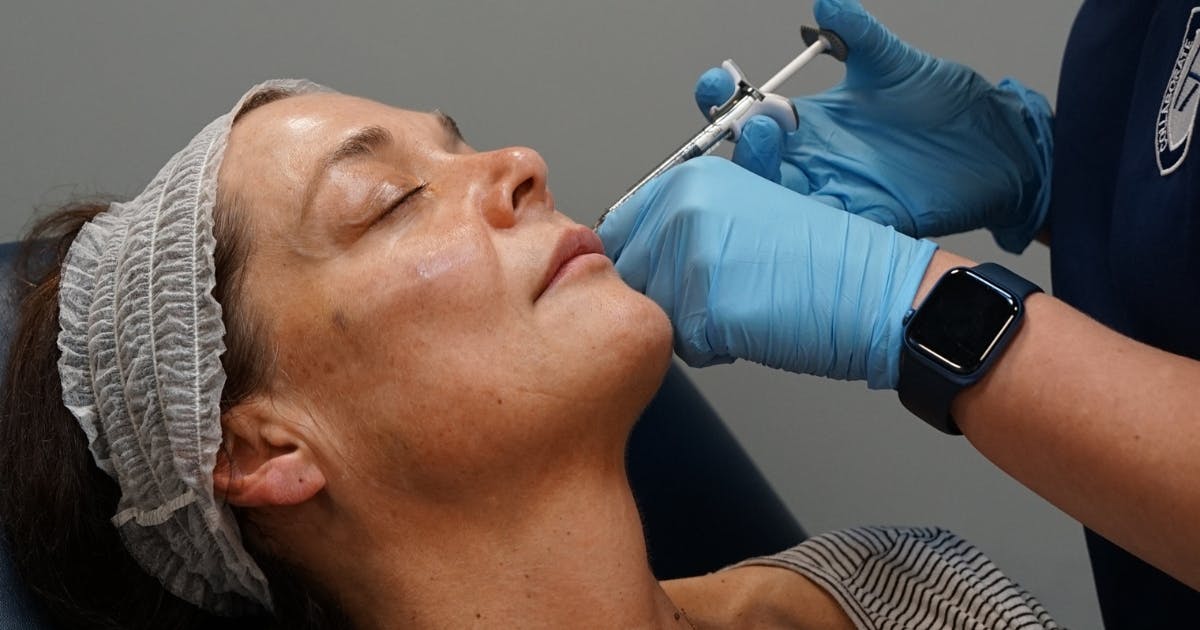
Aesthetic treatments for rejuvenating menopausal skin
When we’re considering treatment plans to address concerns related to menopausal skin, it’s important to remember that every patient is unique. From their anatomical presentation to their medical history and goals. Never assume anything!
As always, we cannot stress enough the importance of a thorough and open consultation for the best possible outcomes.
Cosmetic dermatology offers a wealth of impactful treatment options for menopausal skin. These can be considered as standalone treatment courses, or combined with other skin treatments, topical skincare and/or cosmetic injectables.
Equally, there are various injectables that can target the signs of ageing, beautifully.
Here are just a few of the common concerns your menopausal patients may enquire about and options for addressing them.
Dryness and dehydration
- Review your patient’s skincare routine to identify any contributing factors
- Offer recommendations for a bespoke topical skincare programme focussed on hydration, bearing in mind their budget, time commitment and tolerance for multi-step routines. Hyaluronic acid, squalane and ceramides boast richly hydrating properties
- Skin injectables that offer deep hydration, such as Profhilo, are an efficient yet low-maintenance option.
Uneven skin texture
- Again, a topical skincare routine review and personalised suggestions can be beneficial here. Encourage regular use of a gentle chemical exfoliant and suitable retinol use where appropriate
- Chemical peels featuring AHAs such as glycolic or lactic acid, or a BHA - salicylic acid - are extremely effective at tackling uneven skin texture. Retinol peels can also offer a great solution.
Skin laxity
- Microneedling is a wonderful option as it’s suitable for those who don’t want injectable treatments. Those who are happy with a multi-modal approach can combine injectables with microneedling to best effect
- Skin injectables which hydrate and support the skin’s structure are great candidates for mildly addressing skin laxity. These include Profhilo, skin boosters and polynucleotides
- Laser treatments using an aesthetic energy-based device come into their own when tackling this issue with regular treatments.
Hyperpigmentation
- Encourage your patients to wear broad spectrum SPF30 or SPF 50 every day, all year round, in the correct amount, reapplied as directed! Educate them as to how this can help to improve their ageing features and hyperpigmentation, as cosmetic improvements may be the push they need to improve their diligence, here
- Skincare recommendations for products which promote a more even skin tone, such as retinol or retinal, vitamin C and alpha arbutin, are useful for pigmentation issues
- Chemical peels are an effective way to tackle mild to moderate hyperpigmentation without the need for extensive skincare routines at home - not counting that non-negotiable SPF use!
- Polynucleotides have been shown to have skin brightening properties for both under-eye and full-face applications.
Wrinkles
- Retinol or retinoid use is a great at-home solution for minimising the appearance of fine lines and wrinkles
- For a clinical skin treatment, microneedling is a frontline collagen induction therapy which can be effective at reducing rhytids
- When it comes to injectables, botox is the primary treatment for dynamic wrinkle reduction, especially in the upper third of the face, the ‘bunny lines’ and the chin
- Profhilo offers another injectable option for those who aren’t keen on toxin, especially if the lines and wrinkles are enhanced by dehydration.
Volume loss
- Judicious use of dermal filler, where the appropriate product is used in the correct dose and injected using the optimal tools, in the right way, will provide meaningful volume restoration results for menopausal facial rejuvenation
- Consider the face as a whole, with potentially smaller doses but more areas being treated, for a more natural result that retains the patient’s authentic appearance. Full-face or ‘multi area’ filler treatment plans can be incredibly effective for this concern. They may benefit from being part of a holistic approach that considers the skin first in order to better prepare the ‘canvas’ of the face for fillers
- Profhilo Structura is a newer addition to the aesthetic practitioner’s toolkit and offers filler-like results by regenerating subcutaneous fat to restore volume in patients with ‘sinking’ and ‘sagging’ facial indications.
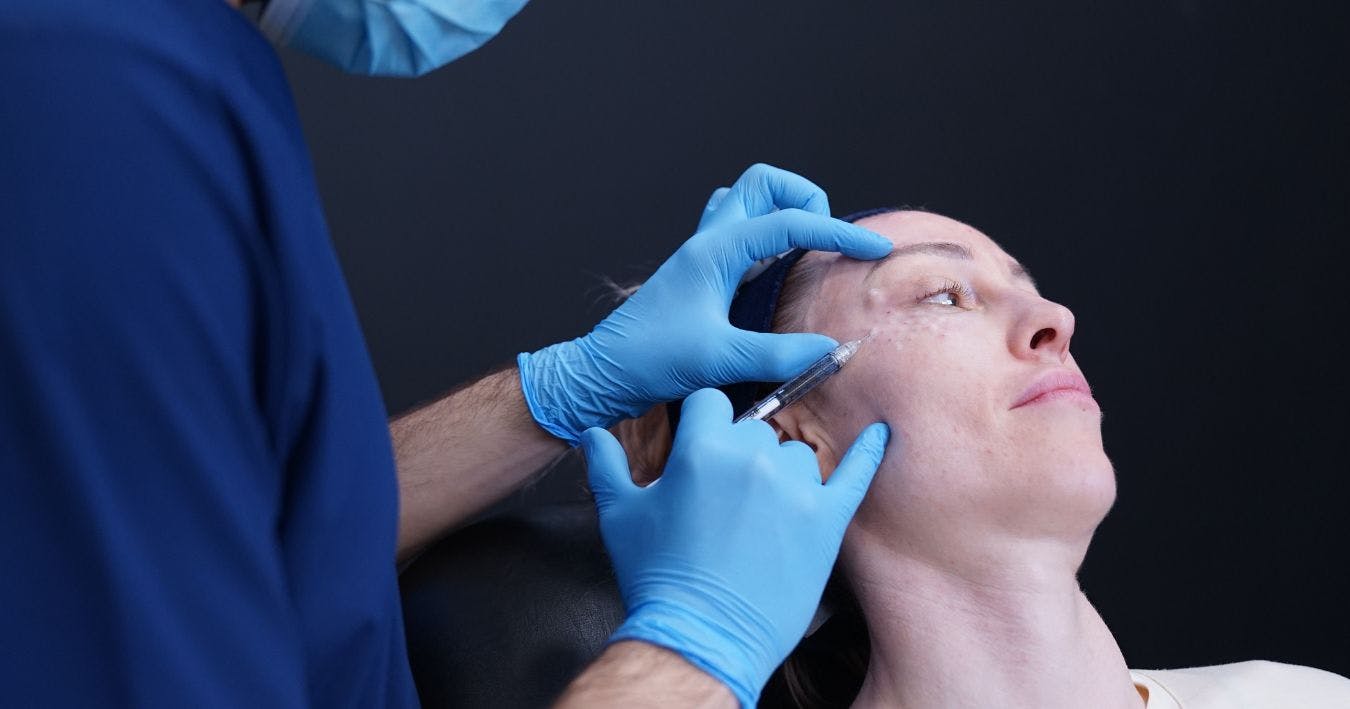
Why marketing your services for rejuvenating menopausal skin makes business sense
We’ve already set out the array of positive benefits you offer to menopausal patients as a medical aesthetics practitioner. However, aside from the pride and gratification of seeing the impact these treatments make to your patients, there’s another compelling reason to actively promote these services…
Consider your patient demographic - it’s likely your area has a significant number of women who may be interested in your offering. Furthermore, compared to younger cohorts, they’re likely to have a higher disposable income.
Whilst individual and geographic factors should be considered for a true picture, women in their 40s and 50s are often more financially independent. Though typically it’s suggested that women in the UK tend to spend most on beauty treatments in their mid-30s and 40s, this age band is expanding upwards.
There continues to be a growing trend for women of perimenopausal and menopausal age to spend more on their appearance.
So if there are patients wanting to pay for a service that you’re offering, it only makes financial sense to let them know you’re ready to welcome them!
The best aesthetics training course for a holistic approach to botox, fillers and skin treatments
Harley Academy has recently renamed our most popular combined aesthetics course which covers botox, fillers and skin treatments.
The Level 7+ is your go-to medical aesthetics training if you want to gain:
- A respected, Ofqual-regulated, postgraduate level qualification in botulinum toxin and dermal fillers with JCCP approval
- Certification in cosmetic dermatology treatments including chemical peels, microneedling, polynucleotides and other skin injectables
- A broad knowledge of skin health, facial ageing and facial anatomy
- Deep working insights into evidence-based applications for botox and filler treatments for both rejuvenation and beautification purposes
- An education in the ethical and legal considerations in aesthetic medicine
- Hands-on practical training comprising one-to-one mentoring sessions where you’re encouraged to ask questions to maximise your experience
- A holistic approach to treating a wide range of aesthetic concerns that allows you to deliver effective, natural-looking results that bring commercial success.
For more information on our range of skin and/or injectables courses, including the authorised Profhilo Training Course, do get in touch.
Our helpful team will be happy to talk you through your options, answer your questions and provide information on aspects from how aesthetics training may be impacted by the incoming licensing scheme, to payment plans.
Simply book a call in for a date and time that’s convenient for you.
All information correct at time of publication
Download our full prospectus
Browse all our injectables, dermal fillers and cosmetic dermatology courses in one document
By submitting this form, you agree to receive marketing about our products, events, promotions and exclusive content. Consent is not a condition of purchase, and no purchase is necessary. Message frequency varies. View our Privacy Policy and Terms & Conditions
Attend our FREE open evening
If you're not sure which course is right for you, let us help
Join us online or in-person at our free open evening to learn more
Our Partners














STAY INFORMED
Sign up to receive industry news, careers advice, special offers and information on Harley Academy courses and services

